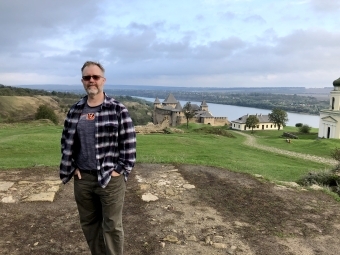John Ballard ’96 Led Team Tasked With Getting Americans Out of Ukraine
March 23, 2022
- Author
- Lisa Patterson

John Ballard ’96 looks out from the balcony of his apartment in Kyiv. Ballard and his family evacuated to the United States before the invasion.
John Ballard left the Ukrainian capital Kyiv on Super Bowl Sunday, along with other U.S. Embassy staff ordered to evacuate. The move came as fears of a Russian invasion mounted.
Ballard ’96, a career foreign service officer with more than two decades of experience, held posts in Uzbekistan, India, Brazil and, most recently, Ukraine. In his role at the embassy, Ballard leads a team dedicated to the safety of Americans abroad.
What do you do in your role at the embassy?
I have served as Consul General at U.S. Embassy Kyiv since 2019, leading the consular section’s team of local employees and American officers. The Department of State has no higher priority than the safety and security of U.S. citizens overseas, and consular sections in particular are responsible for American Citizen Services (ACS) and visa adjudications.
In “normal” times, while the ACS unit provided routine passport and other services and assisted U.S. citizens in individual emergency situations, the rest of the Kyiv consular section was a bustling visa operation that facilitated the legal immigration or temporary travel to the United States for Ukrainian citizens, including fiancées and family members, students and tourists, and newly adopted children.
How does your work change in times of war?
The best way to be safe during a war is not to be present when it happens. Since November 2021, my consular section was hyper-focused on getting as many people out of potential harm’s way as possible. In addition to continuing our immigrant visa processing, we kept U.S. citizens informed on the growing threat via security alerts, published travel advisories encouraging them to leave Ukraine, and hosted a town hall attended by over 850 U.S. citizens to address their concerns. Check out travel.state.gov if you want to see these travel advisories and alerts to get a sense of what we were sharing.
My team actively monitored and reported on the availability of commercial flights and worked closely with host government officials to facilitate the departure of U.S. citizens. Even after the embassy had to suspend operations and depart Ukraine because of the imminent threat of Russian military invasion, consular personnel in neighboring countries and in Washington, D.C., have worked around the clock to facilitate the departure of any U.S. citizens remaining in the country.

Ballard traveled extensively throughout Ukraine. He is pictured in Khotyn, a city in Western Ukraine. In the background, Khotyn Fortress (built in 1325) rests along the bank of the Dniester River.
When did you leave Ukraine?
I departed Ukraine on an Embassy evacuation flight on Super Bowl Sunday. I remember the day clearly, because as a life-long Bengals fan I watched the first half of the game at baggage claim after my flight landed in Washington. My family, including golden retriever and cat, departed in January.
Leaving Ukraine was difficult but necessary because of the looming threat. A small group from the embassy, including my American Citizen Services chief, relocated briefly to Western Ukraine to continue assisting U.S. citizens, until they, too, had to leave the country due to the Russian invasion.
What happens to Ukrainian nationals who work for the embassy?
The Department of State has provided additional financial support to local staff to help enable them to move themselves to safety. Like others in Ukraine, some have chosen to stay, perhaps even to fight. Some want to depart with their families, but conscription laws prevent most Ukrainian males from doing so. Others have families in cities that are completely encircled by Russian forces.
I can’t begin to imagine the pain—both physical and emotional—they are going through, and it is heart wrenching to see this beautiful country reduced to rubble.
Is there anything else you would like readers to know?
I joined the Foreign Service over 20 years ago to represent my country and serve the American people. The road can be difficult—this is not the first time my family has been evacuated from a country—but I know the work we do every day matters to the visa applicants and the U.S. citizens needing assistance in a time of great need.
For anyone interested in a rewarding career, consider the Foreign Service. For anyone traveling overseas, please register with the U.S. Embassy via the Smart Traveler Enrollment Program (STEP) and “know before you go” at travel.state.gov. For more, visit this comprehensive State Department reference on Ukraine and how to help.
John Ballard, ’96, is a Senior Foreign Service Officer currently assigned as the Consul General at the U.S. Embassy in Kyiv, Ukraine. The views expressed here are the author’s own and not those of the U.S. government.



